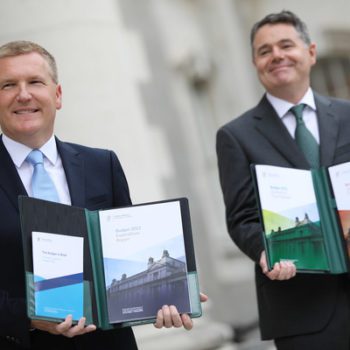Budget 2022: What will it mean for your business?

Minimum wage up 30c, cigarettes up 50c, carbon tax increased by €7.50 per ton and 9% VAT rate for hospitality remains
12 October 2021
Minister for Finance Paschal Donohoe and Minister for Public Expenditure Michael McGrath presented Budget 2022 this afternoon as a multibillion-euro package aimed at tackling the rising cost of living.
The main points affecting businesses in the FMCG sector include that the Employment Wage Subsidy Scheme will be extended. However, it will be wound down in the new year, with two rates introduced, and closed to new entrants.
The minimum wage is set to rise by 30c to €10.50.
Meanwhile, the 9% VAT rate for the hospitality sector has been retained until August next year, while 50% excise relief will be introduced for small producers of cider.
What’s more. €60 million will be allocated for the extension of the waiver of commercial rates on a targeted basis, from 2021 funding.
The carbon tax will be increased €7.50 per ton, while an extra 50c will also be added to every pack of cigarettes, meaning that a pack of 20 will cost €15.
For workers, an income tax package of €520 million will be introduced, with standard rate bands increased by €1,500. Personal tax, employee tax and earned income credits will also be increased by €50.
Those working from home will also also be able to claim an income tax deduction of 30% of the cost of vouched heat, electricity and broadband expenses incurred.
Reaction
Retail Ireland, the Ibec group that represents the retail sector, welcomed the extension of the Employment Wage Subsidy Scheme into next year in Budget 2022.
The group said that while much of the retail sector was bouncing back, it would be a long road to recovery for many businesses. In key retail districts footfall has yet to fully recover and businesses remain in survival mode.
“Labour shortages are now an acute challenge for many retailers,” said Retail Ireland director Arnold Dillon. “The high cost of housing and childcare is making Ireland a less attractive place to live and work. Increasing the allocation of money for quality housing and childcare is crucial, but so too is accelerating the delivery.
“Additional funds to support the development of vibrant town centres and address dereliction are vital to help create vibrant town and city centres into the future,” he added. “In the immediate term, additional money for gardai to tackle anti-social behaviour is welcome. The pandemic has seen many of our key urban centres being neglected. These areas need a refresh and a relaunch”
Meanwhile, Ibec group Food Drink Ireland welcomed the Brexit Adjustment Reserve allocation of €500 million for 2022 and a similar amount for 2023 in Budget 2022.
“As the sector most affected by Brexit, funding must be made available quickly to support food and drink companies to address the additional costs of trading with Great Britain as well as investments in innovation and market diversification,” said Paul Kelly, FDI director.
He also welcomed the €4 million allocation to establish the National Food Ombudsman and said the objective must now be effective and efficient enforcement of unfair trading practices legislation.



 Print
Print






Fans 0
Followers